LETTER FROM LONDON: What Made Dominic Cummings Dash to Durham?
The story of Boris Johnson’s chief of staff driving 264 miles while Britain was under lockdown and the scandal that ensued, as explained from London by Alexander Mercouris.
By Alexander Mercourisin LondonSpecial to Consortium News
Despite Boris Johnson’s and the Conservative government’s mishandling of the Covid-19 crisis, their opinion poll ratings until recently remained high.
In early May, the Conservatives were polling above 50 percent. Johnson’s popularity actually increased after he announced the lockdown on March 23.
Shortly after Johnson fell ill with Covid-19 and had to be hospitalised. An outpouring of sympathy followed, and his poll ratings increased further.
As April ground on, with Britain in lockdown, Johnson’s and the Conservative Party’s poll ratings remained resilient. In late May they finally began to fall. However the decline was gradual.
All this changed dramatically over the course of a single week.
In the week commencing May 22 Johnson’s popularity crashed by 20 percentage points. The government’s crashed by nine.
The Conservatives still hold a lead over Labour, which according to different polls is somewhere between 4 and 8 percent, but this is far smaller than the 20 percent lead the Tories were holding in early May. For the first time since the December election the Conservatives look vulnerable. The result, as the media is reporting, is fraying nerves.
The shift in the opinion polls probably underestimates the shift in sentiment. Many who still say they would vote Conservative are for the first time since the December election angry with the government. The mail boxes and email accounts of Conservative MPs are said to be clogged with angry messages from these people.
Though a gathering feeling in the country that the government had seriously failed in its management of the Covid-19 crisis would almost certainly have caused its poll ratings in time to fall, the scandal surrounding Dominic Cummings, Johnson’s chief adviser, has undoubtedly acted as a major catalyst.
It also highlights certain important features of the Johnson government.
Dominic Cummings: Man of the Elite, not the People
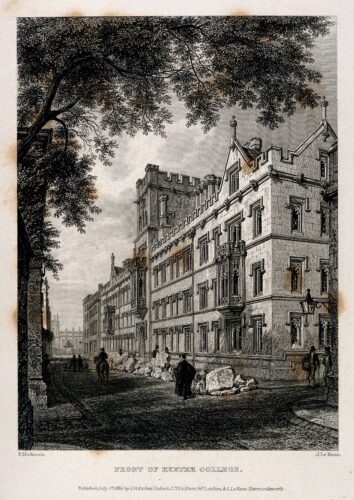
Historic view of Exeter College, Oxford: front. Line engraving by J. Le Keux,
(Wellcome Library, London. Wellcome Images)
(Wellcome Library, London. Wellcome Images)
Numerous myths surround Cummings, so some things should first be said about him.
Contrary to Cummings’s practised pose as an anti-elitist “man of the people”, including his exceptionally casual style of dress, he is in reality by education and social background an entirely stereotypical member of Britain’s political elite.
He is also someone who, despite the fact that he has never formally joined the Conservative Party, has made his career very much within its structures, and who is closely associated with it.
Wealthy Family
Cummings’s father has had a varied career, but was primarily an oil rig construction project manager for the leading British construction firm Laing. In Britain, this is a highly paid job, which has made Cummings’s father a wealthy man, and an owner of a farm in Durham.
On his mother’s side, Cummings’s uncle is a retired Court of Appeal judge, who is also a professor of law at Cambridge University.
Privileged Education; Brief Business Career in Russia
Cummings started his education in the state school system. However he eventually transferred to Durham School, one of the small ring of elite English private schools which the British, to the bafflement of outsiders, call “public schools”, and which are the traditional, expensive and exclusive training grounds of Britain’s elite.
After school Cummings studied History at Oxford University’s Exeter College, where he was taught by the well known historian Norman Stone. Both the subject and the university are typical for members of Britain’s elite, especially those who have set their sights on a political career.
A brief three year business career in Russia followed in the 1990s, over the course of which Cummings acquired a good knowledge of Russian and a love for Dostoyevsky. This apparently involved an attempt to set up a regional airline in the Russian city of Samara, which however was unsuccessful.
The Conservative Eurosceptic
After his stint in Russia, Cummings returned to Britain, where he quickly attached himself to the rising Eurosceptic wing of the Conservative Party even if, for unknown reasons, he never formally joined the party.
From 1999 to 2002 Cummings was campaign director at Business for Sterling, a campaign group campaigning against British membership of the eurozone, a stance central to the Conservative Party’s campaign in the 2001 general election.
Aide to Iain Duncan Smith; Falling Out With Iian Duncan Smith
In 2002 Cummings had become a paid adviser (director for strategy) for the Conservative Party’s new leader, Iain Duncan Smith.
Duncan Smith and Cummings however quickly fell out, with Cummings resigning after just eight months.
Duncan Smith had won the Conservative leadership unexpectedly because his strong anti-Europe stance was popular with the Conservative Party’s grassroots. However he was never accepted by the Conservative parliamentary party, and was eventually ousted as leader as a result of an internal party coup in October 2003.
By resigning his position as Duncan Smith’s director for strategy Cummings acted to dissociate himself from a political leader who was visibly failing. He drove home the point by publicly accusing Duncan Smith of incompetence.
This episode is an early example of Cummings’s anxiety to avoid association with a clearly failing enterprise.
It is also however an early example of the sort of action which has given Cummings his reputation for opportunism and disloyalty, which has dogged him for the whole of his career.
It also made for Cummings a powerful enemy in the person of Iain Duncan Smith.
First Spell in the Wilderness: Job at The Spectator;
Connecting with the Wakefields
Connecting with the Wakefields
Cummings seems to have spent the next three years doing fringe jobs in assorted Conservative oriented think tanks and campaign groups.
However by 2006 he was in “overall charge” of the website of The Spectator, Britain’s leading centre-right news magazine, whose editor from 1999 to 2005 was Boris Johnson.
Cummings probably got his job at The Spectator through the help of his friend Jack Wakefield, whom Cummings may have got to know through his work in Russia.
Jack Wakefield, a scion of a prominent establishment family (his father is Sir Edward Humphrey Wakefield, 2nd Baronet, and his grandfather and great uncle were both Conservative politicians) was from 2008 to 2013 director of a charitable foundation set up by Dmytro Firtash, a Ukrainian billionaire businessman who is believed to have links to Russia.
Jack Wakefield’s sister, Mary Wakefield, was from 2001 assistant editor of The Spectator, where she continues to work today as commissioning editor. Jack Wakefield has also from time to time contributed articles to The Spectator as an art critic.
The strength of the connection between Cummings and the Wakefields was demonstrated in 2011 when Mary Wakefield and Cummings married.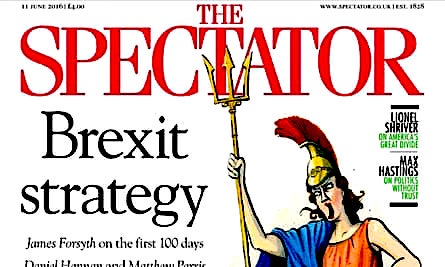

If Cummings did obtain his job at The Spectator through the help of the Wakefields, then this illustrates the extent to which he is, contrary to his public image, very much an insider who relies on establishment connections to get ahead.
It is possible that it was also through the Wakefields that Cummings got to know Boris Johnson.
Though Johnson ceased to be editor of The Spectator in 2005 he continued to have his articles published there when Cummings was in “overall charge” of the website.
Obviously Johnson knows Mary Wakefield, since she was one of his assistant editors when he was editor.
It is therefore likely that it was the Wakefields who introduced Johnson and Cummings to each other, or they may have got to know each other through their work for The Spectator.
It is however also possible that Johnson and Cummings already knew each other before Cummings joined the magazine. Since they moved in what were essentially the same social and political circles, it would have been only a matter of time before they became acquainted with each other, even without the help of the Wakefields, and without the connection provided by The Spectator.
If Johnson and Cummings did get to know each other at this time, or even earlier, it was without consequences.
By general agreement, Johnson and Cummings forged their political bond only later, when they were both working for Vote Leave.
Aide to Michael Gove; Breakthrough into Government
Cummings’s apparent breakthrough came in 2007 when he became a paid adviser to the ambitious and rising Conservative politician Michael Gove who placed third behind Johnson in last year’s leadership contest.
Following the Conservative victory in the 2010 general election Gove joined the cabinet as Education Secretary. Cummings, in February 2011, became Gove’s special adviser (on a state salary) and chief of staff. Appointment as a government minister’s special adviser is in Britain an entirely conventional route into parliamentary politics.
Following his appointment, Cummings would have had a well-founded expectation that before long a safe Conservative seat would be found for him, which would enable him to take his seat in the British Parliament.
A ministerial career might follow thereafter, beginning as a parliamentary private secretary (PPS), for a minister, most probably his patron, Gove.
Intrigues and Bullying
Instead things went wrong.
British political culture expects, and even requires, special advisers to be brash. There is even a BBC TV comedy series – The Thick of It – about it. However, even by that standard, Cummings seems to have gone too far.
Before long he had acquired a reputation for intrigue and bullying, which has stuck to him ever since.
In 2012 a woman civil servant was awarded £25,000 compensation after she complained of being bullied by Cummings.
After Cummings left his position as Gove’s special adviser, Gove was forced in June 2014 to disownhis ally after Cummings’ called the sitting prime minister, David Cameron, “bumbling,” and Cameron’s chief of staff a sycophant. Nick Clegg, the then deputy prime minister, said Cummings seemed to have “anger management problems”.
Cummings’ hopes of a political career appeared dashed.
Second Spell in the Wilderness
Cummings supposedly began this spell in the wilderness talking about setting up his own free school, though nothing seems to have come of the idea. In practice he seems to have returned to his parents’ home in Durham, and to have spent the next year there.
Unsurprisingly, the crash of his political career before it had even properly begun seems to have embittered Cummings, leaving him with a strong sense of grievance, as well as with an enduring grudge against Britain’s professional civil service and its culture.
Gove to the Rescue: Campaign Director for Vote Leave
Cummings was rescued from the wilderness by his old patron Gove. With the 2016 Brexit Referendum now looming, Gove seems to have been instrumental in getting Cummings picked in October 2015 as the campaign director for Vote Leave, the largely Conservative anti-EU campaign group, of which Gove, together with the Labour MP Gisela Stuart, was the convenor.
The Brexit Referendum
The part played by Cummings as Vote Leave’s campaign director in achieving Leave’s unexpected victory in the 2016 Brexit referendum has become the stuff of legend.
That is because it mostly is legend, given massive publicity by a 2019 British TV drama – “Brexit: The Uncivil War” – in which the part of Cummings is played by the actor Benedict Cumberbatch.
Cummings was undoubtedly a skilful campaign director, and he did come up with the famous slogan “Take Back Control”. He also came under fire for using Big Data to help manipulate the referendum vote.
However it is important to say that a critical mass of the British electorate, especially in England, had already been won over to Brexit well before the referendum campaign began, in no small part because of the efforts over many years of Nigel Farage and his anti-Europe UKIP party.
Farage, together with his friend the businessman Arron Banks, in fact ran an entirely separate pro-Brexit campaign during the referendum, Leave.EU, which was wholly independent of Vote Leave, the campaign run by Gove, Stuart and Cummings.
The two pro-Brexit campaigns, Vote Leave and Leave.EU, were in fact on bad terms throughout the campaign, with each refusing to have anything to do with the other.
Vote Leave was the bigger and better funded campaign. It included the well-known pro-Brexit Westminster politicians, such as Gove, Boris Johnson and Stuart, as well as a host of other establishment figures.
Unsurprisingly, in view of its establishment connections, it was Vote Leave which was recognised by the Electoral Commission as the ‘official’ pro-Brexit campaign, and which was treated as such during the campaign by the British media.
By contrast the media largely ignored Leave.EU, which after the campaign became the target of a series of inquiries and investigations launched against it by the Electoral Commission, the National Crime Agency, the Metropolitan Police, and the Information Commissioner’s Office, none of which however resulted in any criminal case being brought against it or against any of its members.
The greater prominence given to Vote Leave may not reflect the reality of what happened during the referendum on the ground.
In my opinion, especially in the crucial electoral battlegrounds in the Midlands and northern England, where Farage and UKIP had already been making big inroads before the referendum, Leave.EU was almost certainly decisive in bringing out the pro-Brexit vote.
Farage is known to feel that Cummings and Vote Leave have been given credit for the referendum victory which properly belongs to Leave.EU and to him.
Farage and Cummings remain on bad terms to this day.
Johnson and Cummings: First Contact?
One important consequence of Cummings’s role as campaign director of Vote Leave is that it brought Cummings to Boris Johnson’s attention.
Up to this point Cummings had been thought of within the Conservative Party as being very much as Gove’s man.
However, though Gove, as Vote Leave’s co-convenor, theoretically outranked Johnson within Vote Leave, Johnson, as the more popular and effective campaigner, quickly became Vote Leave’s public face.
Johnson’s role as Vote Leave’s lead campaigner must have brought Johnson into close contact with its campaign director, who was of course Cummings.
Though the two men probably already knew each other at The Spectator, it is likely that what was to become currently Britain’s most important political relationship was forged during this time.
It was however to be a further three years before this became significant.
Third Spell in the Wilderness
Though Cummings is widely credited with the success of Vote Leave’s campaign, as soon as the campaign was over he found himself back in the political wilderness.
His patron, Gove, was quickly sacked from the cabinet by the new prime minister, Theresa May, who during the referendum had voted remain, and who was antagonistic to Gove, whom she considered an intriguer.
Even after Gove returned to the cabinet in 2017 as Environment Secretary, he did not bring Cummings back with him as his special adviser.
A reasonable guess is that this was because Cummings continued to be unacceptable to May, both because of his reputation for bullying and intrigue whilst he had been Gove’s special adviser, and because of his role as campaign director of Vote Leave.
The Big Breakthrough: Prime Minister Johnson’s Chief of Staff
It was only after Johnson replaced May as Prime Minister in July 2019 that Cummings was plucked by Johnson back out of the political wilderness, with Johnson appointing Cummings his chief adviser and chief of staff on July 24 last year.
An Insecure Prime Minister
Johnson’s motive for doing this was almost certainly his insecure position as Conservative leader and prime minister.
Johnson had used Brexit to outmanoeuvre and eventually oust his two predecessors, David Cameron and May.
Johnson had however been very much a late convert to the cause of Brexit. He was, as a result, widely mistrusted, not just by the Conservative Party’s still significant body of anti-Brexiteers, amongst whom he was widely disliked, but by many of its pro-Brexiteers as well.
In truth, at this time Johnson was not especially well regarded by any part of the Conservative Party’s parliamentary leadership.
In addition to his reputation for opportunism and ambition, some Conservatives looked on Johnson’s habitual clownishness with distaste, and there were also concerns about what was seen as his disorderly private life. There were also doubts about his competence in light of his relaxed management style as mayor of London.
Were it not for the crisis which existed at that time around the issue of Brexit, it is inconceivable that Johnson would ever have become leader of the Conservative Party or prime minister.
Minding Johnson’s Back
Given Johnson’s precarious position as Conservative leader and prime minister, it is not surprising that he turned to Cummings to be his chief of staff, someone who, like himself, was something of an outsider within the Conservative Party.
In Cummings, Johnson not only has someone working for him whom he can rely on. Cummings’s propensity for bullying and intrigue, which makes Cummings unacceptable to so many people, makes him the perfect person to mind Johnson’s back.
In addition, it is often said that Johnson, who some see as an intellectual lightweight, looks to Cummings, who has a reputation for brilliance, for his ideas.
In my opinion this underestimates Johnson’s real, if facile, intelligence, whilst overstating Cummings’s.
The articles Cummings’s has written on his blog show someone who does possess high intelligence. However they seem to me short of ideas that would make up an actual programme for a government. Their focus instead seems to be on topics like behavioural science, data use, process, and political method.
So far there is no evidence that Cummings, as Johnson’s chief adviser, has come up with any ideas that would amount to a programme for the government.
Michael Gove: The New Enemy?
One person who apparently took Cummings’s new appointment badly was Cummings’s former patron and boss, Gove.
Gove, who makes little secret of his ambitions to become prime minister himself one day, apparently saw Cummings’s switch of loyalty to Johnson as something of a personal betrayal.
Gove and Johnson have a tense relationship. Though at one time political allies and friends, Gove, as co-convenor of Vote Leave, seems to have resented the greater attention given to Johnson during the referendum campaign.
In July 2016 Gove wrecked Johnson’s first attempt to become prime minister by standing against Johnson in the Conservative Party’s leadership election, which took place after David Cameron resigned following the Brexit referendum result.
The result was that May became Conservative leader and prime minister instead of Johnson, who was named foreign secretary.
Subsequently, in 2018, Gove and Johnson went through the motions of a reconciliation, and Gove’s prominence as a leading Brexiteer within the Conservative Party, and his previous position as co-convenor of Vote Leave means, that Johnson cannot, at least for the moment, deny him a place in the cabinet as minister for the cabinet office.
However, the two men continue to mistrust each other.
The Purge: Targeting Sajid Javid
Unsurprisingly, Cummings’s priority as Johnson’s chief of staff has been to weaken Johnson’s potential rivals within the Conservative Party and the cabinet.
His primary method of doing this has been to deny senior ministers’ their choice of special advisers, putting in their place special advisers answerable to himself.
The cull began immediately, with the sacking in August 2019 of Sonia Khan, the special adviser of Sajid Javid, the new chancellor of the exchequer, who had run against Johnson in the Conservative Party leadership election, which Johnson had won just a month before.
As a leading Brexiteer often spoken of as a possible Conservative leader, Javid is an obvious potential rival to Johnson, making the decision to target him unsurprising.
In an extraordinary display of power, Cummings summoned Khan to 10, Downing Street, told her she was sacked, and then had her escorted from the building by armed police. Her erstwhile boss, Javid, was not consulted or informed in advance.
Khan has since brought a sex discrimination case against the government in which Cummings is named as a respondent.
The following month The Times of London was reporting that Johnson had granted Cummings more powers over ministers’ special advisers. Henceforth special advisers’ employment contracts were to specify that they were answerable on disciplinary matters to the prime minister’s chief of staff, ie. to Cummings, as well as to their own ministers.
Cummings continued to target Javid after the December election.
Reports began to appear in the media of plans to create a new economics “super ministry”, to be led by Rishi Sunak, the chief secretary of the Treasury and seen as a Johnson loyalist, in rivalry to Treasury, which was headed by Javid.
By this point Sunak was already being spoken of in the media as Cummings’s spy in the Treasury, “keeping an eye” on Javid.
A showdown followed in February, in which Johnson told Javid that he could remain chancellor, but only if he agreed to sack all his special advisers at the Treasury, replacing them with special advisers hand picked for him, and answerable to, Cummings.
Javid refused and resigned, telling the media that ”no self-respecting minister would accept those terms”.
Sunak was then immediately appointed chancellor, after agreeing to Johnson’s terms.
Thereafter no more about creating a new “economics super ministry” was heard.
Appointing ‘Weirdos’
As to the sort of persons whom Cummings says he wants to recruit into government in place of those he wants to sack, he has described them in a post on his personal blog.
As well as the usual emphasis on mathematics and science graduates, the post invites applications from:
“Super-talented weirdos.People in SW1 talk a lot about ‘diversity’ but they rarely mean ‘true cognitive diversity’. They are usually babbling about ‘gender identity diversity blah blah’. What SW1 needs is not more drivel about ‘identity’ and ‘diversity’ from Oxbridge humanities graduates but more genuine cognitive diversity.We need some true wild cards, artists, people who never went to university and fought their way out of an appalling hell hole, weirdos from William Gibson novels like that girl hired by Bigend as a brand ‘diviner’ who feels sick at the sight of Tommy Hilfiger or that Chinese-Cuban free runner from a crime family hired by the KGB. If you want to figure out what characters around Putin might do, or how international criminal gangs might exploit holes in our border security, you don’t want more Oxbridge English graduates who chat about Lacan at dinner parties with TV producers and spread fake news about fake news.”
The comments about “Oxbridge humanities graduates” and “Oxbridge English graduates who chat about Lacan at dinner parties with TV producers” come across as rather odd, especially coming from Cummings, who is himself an Oxford humanities graduate.
They elicited a tart reply in a letter to the Evening Standard from my wife, Dr. Catherine Brown, who is an English Literature academic and head of English at London’s New College of the Humanities (full text on her blog).
The key point about “weirdos” is however that they would be, by definition, people who would owe their jobs entirely to Cummings. They would therefore be completely dependent on him, and therefore completely loyal to him.
As is all too typical of Cummings, behind the anti-establishment and anti-elitist rhetoric, lies a power grab.
Centralise Power; Leave Elections to Others
By contrast, even as he was busy centralising power, sacking special advisers, targeting the Chancellor, and appointing “weirdos”, Cummings was happy to leave the campaign for the government’s re-election to others.
Despite Cummings’s reputation as a brilliant campaign manager, his role in the Conservative Party’s successful campaign in the December general election was small. The person who managed the Conservatives’ campaign in the election was not Cummings, but the veteran Australian political strategist Isaac Levido.
It was Levido, not Cummings, who came up with the Conservatives’ famous slogan during the election “Get Brexit Done”, though typically Cummings is not averse to people attributing the slogan to him.
It was also Levido, not Cummings, who came up with the government’s equally famous slogan during the current Covid-19 epidemic “Stay At Home, Protect the NHS, Save Lives”. This slogan has since caused Cummings much grief.
The reality is that though managing campaigns is something Cummings knows how to do, and does well, it is not what principally interests him.
Rather it is a means to an end, that end being a position of power within government. Ultimately he is a political insider and skilled bureaucratic infighter, not a professional campaigner.
Johnson and Cummings: Two Insiders/Outsiders
I have set out Cummings’s back story in some detail because without it it is impossible to understand either Cummings’s actions, which caused the recent scandal, or Johnson’s determination to hold on to Cummings, despite the great political cost.
Johnson and Cummings are political figures with backgrounds which in British political elite terms are entirely conventional.
Both have followed what were up to a certain point typical career paths. In both cases this has involved the Conservative Party, even if in Cummings’s case he has never actually been a member of the Conservative Party.
Both Johnson and Cummings are however also in a sense outsiders.
Both have reputations for opportunism and intrigue, which have won them few friends but many enemies, and which is the reason for the many setbacks they have suffered.
These have in turn led them to hold abiding feelings of grievance and insecurity, as well as entitlement, which explains their tendency to look for support to the fringe, and outside the mainstream.
In Cummings’s case, though he is not without his fans, he has a habit of making enemies which is nearly compulsive. He has in a comparatively short career managed to make enemies of his two previous patrons, Duncan Smith and Gove, both now important members of the cabinet.
To these must now be added Javid, who though no longer a member of the cabinet or even a minister, remains a powerful figure in the Conservative Party.
Despite his reputation as a hardline Brexiteer, Cummings has also spoken scathingly of the Conservative Party’s hardline Brexiteers organised in the European Research Group, and of their leader, the influential Conservative MP and cabinet minister Jacob Rees-Mogg.
He once called them “useful idiots” who should be “treated like a metastasising tumour [to be] excised from the UK body politic.”
His relationship with this group is tense, a fact which was already apparent during the referendum campaign, when he was campaign director for Vote Leave.
I have already spoken of the bad terms between Cummings and Farage.
Amongst anti-Brexiteers Cummings is, of course, widely feared and detested, not least for the part he is widely believed to have played in winning the Brexit referendum for Leave.
Cummings has also managed to make enemies within Britain’s professional civil service, across which he is widely feared.
This widespread hostility to Cummings is however precisely what makes Cummings useful to Johnson.
In Cummings, Johnson has a chief of staff who has no option but to be totally loyal to Johnson, since he has by now no one else to turn to.
At the same time Cummings possesses the qualities of ruthlessness and opportunism, as well as a capacity for intrigue, which Johnson admires, and which he shares.
With Johnson himself short of friends, and feeling insecure, it is completely understandable that he relies on Cummings to mind his back.
In a sense the two are made for each other.
March 27- Flight to Durham
The sequence of events which led to the current scandal began on March 27.
According to the account Cummings has given, it began with a telephone call he received at work from his wife, Mary Wakefield, in which she informed him that she was feeling ill. Cummings says that he left Downing Street in response to this call in order to check on Wakefield but then returned to Downing Street later.
However over the course of the day the two discussed the situation with each other, and agreed that Wakefield might be falling ill with Covid-19, though she was not showing symptoms typical of Covid-19 at the time.
Though Cummings himself was not ill, they supposedly agreed that if they both fell ill they would become too weak to look after their four year old son if he became ill also.
Accordingly they took the decision to drive with their son to a house in Durham in the north of England which is located on farm land owned by Cummings’s parents. That would supposedly enable Cummings and Wakefield to call on Cummings’s parents for help with childcare if all three fell ill at the same time.
Without consulting or informing Johnson, Cummings then took his wife and son on a 264 mile drive to the house in Durham.
March 28 to early April – Falling Ill with Covid-19
On the following day, March 28, Cummings says that he himself fell ill with Covid-19 symptoms. These got worse so that he remained bed ridden for several days.
At some point he spoke to Johnson – who was also ill with Covid-19 – telling Johnson of his illness and of the fact he was in Durham.
On March 30, Downing Street confirmed that Cummings had fallen ill with Covid-19, and said that he was self-isolating. However it did not say that Cummings was in Durham instead of London.
By this point both Cummings and Wakefield were supposedly ill with Covid-19. However Cummings has confirmed that he has never in fact been tested for Covid-19, and it seems that Wakefield has never been tested either.
On April 2, Cummings’ and Wakefield’s son fell ill, and was taken to hospital by ambulance. He was tested for Covid-19 but the test eventually came back negative.
Cummings says he was too ill to go to the hospital but Wakefield went with the son in the ambulance. Cummings collected them by car the next day, but says that he did not get out of the car.
April 12 – Drive to Barnard Castle
On April 12, Wakefield’s birthday and Easter Day, Cummings, though supposedly still ill, drove the family 30 miles to a local scenic spot, Barnard Castle, where they were spotted by some passers by.
Cummings says this was done in order to test his eyesight, which was supposedly affected by his illness, to see whether he was fit to drive the family back to London, as he was now intending to do on the following day. Cummings says that he then drove the family back to London on April 13.
No Childcare Provided or Sought
Though the ostensible purpose of the journey to Durham was to obtain childcare in the event that Cummings, his wife and his son, all fell ill at the same time, childcare was never in fact sought, either from Cummings’s parents or from anyone else, during the whole period when the family was in Durham, and was not provided by anyone.
Concealing the Flight to Durham – An Article in The Spectator
The fact that Cummings and his wife and son had gone to Durham was not disclosed either by them or by the government, and only became known when it was disclosed by the media at the end of May.
On April 25, Wakefield wrote an article for The Spectator in which she describes her and Cummings’s experience of Covid-19:
“That evening, as I lay on the sofa, a happy thought occurred to me: if this was the virus, then my husband, who works 16-hour days as a rule, would have to come home. I let myself imagine a fortnight in bed with ‘mild symptoms’, chatting to Dom and son through an open door. More fool me.My husband did rush home to look after me. He’s an extremely kind man, whatever people assume to the contrary. But 24 hours later, he said ‘I feel weird’ and collapsed. I felt breathless, sometimes achy, but Dom couldn’t get out of bed. Day in, day out for ten days he lay doggo with a high fever and spasms that made the muscles lump and twitch in his legs. He could breathe, but only in a limited, shallow way…..……As Dom lay sweating, Cedd [Cummings’s and Wakefield’s son – AM] and I made a palace out of polystyrene packaging. I’ve laughed in the past at men who obsess over model railways. I won’t laugh again. In a chaotic and unpredictable environment, there’s nothing more comforting than having total control over your own tiny world. Long after my son lost interest I was busy gluing on towers, and cutting coloured acetate to make window panes. When Dom finally made it into the kitchen, he found me manically applying cheap plastic stick-on gems to a loo-roll tower. ‘Mum’s busy playing,’ I heard Cedd tell Dom, as he trotted off to fetch the oximeter.[…]After the uncertainty of the bug itself, we emerged from quarantine into the almost comical uncertainty of London lockdown. Everything and its opposite seems true. People are frightened and they’re calm; it’s spring and it’s not. Queueing’s a pain in the ass and the most fun you’ll have all day…..”
The article nowhere says that the family had left their usual home in London and that the domestic scenes it describes actually took place in an altogether different home in Durham. On the contrary the sections of the article which I have quoted above seem to me intended to convey the impression that the family had been all the time in their usual home in London.
Cummings’s 264-mile drive with his family to Durham on March 27, his 30-mile trip to Barnard Castle on April 12, and his drive back to London on April 13, all took place whilst Britain was supposedly in lockdown.
Johnson had announced the lockdown in a television broadcast on March 23, just four days before Cummings’s drive to Durham. During his broadcast Johnson gave the British people these instructions:
“From this evening I must give the British people a very simple instruction – you must stay at home. Because the critical thing we must do is stop the disease spreading between households. That is why people will only be allowed to leave their home for the following very limited purposes:—shopping for basic necessities, as infrequently as possible;—one form of exercise a day – for example a run, walk, or cycle – alone or with members of your household;—any medical need, to provide care or to help a vulnerable person; and—travelling to and from work, but only where this is absolutely necessary and cannot be done from home.That’s all – these are the only reasons you should leave your home. You should not be meeting friends. If your friends ask you to meet, you should say No.You should not be meeting family members who do not live in your home.You should not be going shopping except for essentials like food and medicine – and you should do this as little as you can. And use food delivery services where you can.If you don’t follow the rules the police will have the powers to enforce them, including through fines and dispersing gatherings.”
Over the next few weeks the government reinforced the message through a relentless publicity campaign, centred around the slogan “Stay At Home, Protect the NHS, Save Lives”.
Tens of millions of people across Britain, the vast majority of its people, have abided by Johnson’s instructions, both willingly and because they were thought to have the force of law. Every individual who has lived in Britain through the lockdown knows of instances where people who abided by the instructions have experienced severe personal hardship.
I will cite just one example which is personally known to me. This is of a lawyer of my acquaintance who became separated from his wife because they were in different parts of the country on the night when the lockdown was imposed. As law abiding people they observed what they understood to be the rules of the lockdown, and remained apart.
‘Helping a Vulnerable Person’
Cummings justifies his dash to Durham by claiming that since it was intended to obtain childcare for his son it falls within the list of exceptions mentioned by Johnson in his March 23 broadcast, since it was done for the purpose of “providing care or help to a vulnerable person”, in this case Cummings’s four year old son.
This explanation has provoked anger and incredulity across Britain.
Many British parents have had to confront similar childcare issues during the lockdown, without supposing that they might fall within this exception.
The police have imposed numerous fines on people who were caught breaking the lockdown purportedly in order to obtain childcare. The suggestion of Health Secretary Matt Hancock, made after disclosure of Cummings’s dash to Durham, that these fines might be refunded, has since been retracted.
As for Cummings’s claim that he made the 30-mile trip to Barnard Castle on April 12 in order to test his eyesight, that has produced all but universal disbelief and contempt.
Cummings’s Account: Impossible to Take Seriously
Cummings’s claims in truth are difficult to take seriously. In fact they make little sense.
Quite apart from the inherent improbability that the prime minister’s chief adviser and chief of staff and his wife would not have been able to obtain childcare help from the government if they needed it, by Cummings’s own admission, neither he nor Wakefield made any enquiries about alternative childcare options available in London, including from their acquaintances and friends.
Moreover on March 27, the day when Cummings and Wakefield decided to drive north to Durham with their son, neither Cummings nor his son were ill, and it was not known for sure that Wakefield, who was ill, was ill with Covid-19.
A rational response to the situation (and Cummings likes to represent himself as a highly rational man) would have been for Wakefield to self-isolate whilst Cummings arranged to have himself, Wakefield and their son tested for Covid-19, which as the prime minister’s chief of staff it would have been a straightforward thing for him to do.
Depending on the outcome of the tests, a proper decision could then have been made, in consultation with the prime minister, the rest of the government, the chief cabinet secretary, the various civil service department heads, and the National Health Service, about what to do. Almost certainly that would have involved, if the tests had come back positive, providing the family with childcare.
In the event, Cummings was not tested at all and made no attempt to have himself tested, and it seems unlikely that Wakefield was ever tested either. As for the son, when he was tested in Durham, the result was negative.
Instead, and without consulting the prime minister or the government, and apparently without first seeking medical advice or calling a doctor, Cummings took the extraordinary decision to go on a 264 mile drive north to Durham, even though, if he really believed that Wakefield was ill with Covid-19, he would have known, as the prime minister’s chief of staff and chief adviser in receipt of all the latest scientific advice, that this was the surest way possible for Wakefield to infect his son and himself.
Cummings is clearly aware of the illogical nature of his decisions as he has described them. He has tried to explain them by saying that he “believed” before he and Wakefield made their decision to drive north to Durham that he was already infected, and might therefore be about to fall ill with Covid-19.
That would imply that Cummings embarked on a long road journey on the strength of a guess.
It would also mean that Cummings took a decision to embark on a long road journey, driving a car carrying his wife and son, despite the possibility that he might be about to fall ill with Covid-19, which comes with a high fever. That scarcely seems responsible, and frankly it seems unlikely.
Many have also pointed out the irresponsibility of Cummings and Wakefield driving north, stopping at petrol filling stations along the way, with Wakefield supposedly already ill and infected, and potentially spreading the infection all around her.
If Cummings’s explanation for the dash to Durham makes little sense, his account of the drive on to Barnard Castle is all but incredible.
If Cummings really had been so worried about his eyesight that he was unsure whether it was still safe for him to drive, then it beggars belief that he would have driven his wife and son 30 miles to Barnard Castle. Again that looks irresponsible, and frankly unlikely.
Fleeing London in Panic
If Cummings’s explanations make no sense, and are simply not believable, why did he make his now famous drive to Durham?
Inevitably there have been a number of theories, but for the most plausible explanation it is best to look to the events which took place in London on March 27, when Cummings and Wakefield decided to make their dash to Durham.
Cummings running from No. 10 on March 27. (YouTube)
Before dealing with these, it is best to take note however of a number of points about Cummings’s actions, which for me stand out, but which in my opinion have not been given sufficient emphasis.
The first is that Cummings’s Durham dash bears all the hallmarks of panic. It was decided on suddenly and in secrecy, without others (including Johnson) being informed. Its effect, and most probably its purpose, was to remove Cummings quickly from London.
Frankly it looks like an escape.
Secondly, and despite Cummings’s elaborate denials, there is no doubt that he knew both at the time and later that what he was doing was wrong.
Not only did Cummings conceal what he was doing at the time. He continued to conceal it thereafter, as shown by Wakefield’s article in The Spectator, which sought to give the false impression that he had been all the time in London, when in reality he had been in Durham.
Even after the media got wind of the story, and started to ask questions at the end of May, Cummings’s initial response was not to give a frank account of what had happened, as one might expect of someone who thinks he had done nothing wrong and therefore has nothing to hide, but to stay silent, in the hope that the media would tire of the story, and that the story would go away.
Lastly, there is evidence that Cummings, who is known to be nervous and highly strung, has a habit of fleeing to his parents when he is in trouble.
It seems that during earlier periods when Cummings has found himself in the political wilderness, his response has been to return to his parents. His behaviour on March 27 seems consistent with this pattern.
March 27 – Things Fall Apart
The events that day in fact show why Cummings might have thought he was in trouble.
It is known that in February and the first two weeks of March Cummings was a strong supporter of the mitigation strategy to deal with the Covid-19 crisis, which was the one the British government was following at the time.
I have discussed in an earlier Letter from London how this ended in a debacle.
Johnson decided at a meeting in Downing Street on March 14 to abandon the mitigation strategy, and go for the alternative suppression strategy, which included a legally enforced lockdown, though the lockdown was not actually imposed for a further nine days.
Cummings, who had previously supported the mitigation strategy, is known to have attended the March 14 Downing Street meeting and, echoing Johnson, to have spoken in support of the shift to a suppression strategy during that meeting.
On March 27, four days after the lockdown was imposed, Johnson fell ill with Covid-19, as did Health Secretary Hancock, and the country’s chief medical officer, Chris Whitty.

It would not be at all surprising if at that point it looked to Cummings as if things were falling apart.
Not only had the mitigation strategy, which he had previously advocated, been reversed, but Johnson, his patron on whom he is completely dependent, had fallen ill.
It is not difficult to see how Cummings might fear that he might be blamed for the earlier failed mitigation strategy.
Also, if Johnson’s illness became worse, he might not be able to continue as prime minister, in which case Cummings himself might soon be out of a job.
Not only has Cummings few friends in the cabinet or in the Conservative parliamentary party, but at least two members of the cabinet – Duncan Smith and Gove – are his enemies. Moreover one of these – Gove – was the cabinet minister who at the time looked most strongly placed to succeed Johnson, or to be appointed by Johnson as his deputy whilst Johnson was ill.
Given this state of affairs, it would not be surprising if Cummings panicked, and fled back to his parents in Durham, as he has apparently done on other occasions.
In the event, as I have discussed elsewhere, Johnson not only refused to appoint Gove his deputy, but made sure that the deputy he did appoint – Dominic Raab – was not given powers to sack ministers or officials or change policy. That this was partly done in order to protect Cummings is a possibility that has to my knowledge so far gone unremarked and unnoticed.
Johnson also eventually recovered from Covid-19, though his life at one point hung in the balance, and returned to work as prime minister at the end of April. However Cummings would not have known any of this on the day he decided to dash to Durham, March 27.
As to Cummings’s alleged worries about childcare and falling ill with Covid-19, it is perhaps worth saying that the only person able to corroborate Cummings’s account is Wakefield, whose account must be considered unreliable in light of her misleading article in The Spectator.
Perhaps Cummings was worried about childcare, and perhaps he did fall ill on March 28 with Covid-19. However, given the alternatives available to him in London, I doubt these were the real reasons why he chose to flee to Durham.
One fact tends in my opinion to confirm that the decision to escape to Durham had political rather than other causes.
It is now known that on April 14, the day after his return to London, Cummings amended an old piece on his blog to make it seem that he had anticipated a pandemic like the one involving Covid-19.
This is consistent with Cummings’s known obsession to be thought of as brilliant and infallible at all times. However it also looks like a clumsy attempt to distance Cummings from the disastrous mitigation strategy he had previously advocated.
Lastly, on the subject of the trip to Barnard’s Castle, my own opinion, contrary to some others, is that it was intended as a day trip for his wife, who is apparently a practising Catholic, on Easter Day, which this year also happened to be her birthday.
I say this because I have seen no evidence that Cummings did anything else whilst he was at Barnard Castle, and it seems to me unlikely, if he were attending secret meetings there, that he would have brought his wife and son with him.
The Scandal Breaks
The scandal broke on May 22, when The Guardian and Daily Mirror broke the news of Cummings’s flight to Durham.
 Amidst angry protests and calls for Cummings to resign or be sacked, Johnson on Sunday, May 24 held a press conference in which, to general incredulity, he gave Cummings his full backing, saying Cummings had behaved “legally and reasonably”.
Amidst angry protests and calls for Cummings to resign or be sacked, Johnson on Sunday, May 24 held a press conference in which, to general incredulity, he gave Cummings his full backing, saying Cummings had behaved “legally and reasonably”.
Johnson’s support for Cummings at the news conference made the situation worse, with complaints about Cummings becoming angrier, and with an ever growing number of Conservative MPs, some of them committed Brexiteers, queueing up to say that Cummings should go.
Eventually that forced a decision that Cummings would face the media himself. This happened in the form a press conference in the garden of 10, Downing Street, on Monday, May 25.
Over the course of this press conference, Cummings gave the account of his journey to Durham which I have described and discussed above.
He refused to apologise, showed no contrition, insisted that he had acted at all times legally and properly, and justified his actions by claiming that he had acted appropriately within the terms of the “help to a vulnerable person” exception which I have discussed above.
Whilst parts of the media were impressed, Cummings’s press conference angered the public even more, with a general feeling that he had behaved like a lawyer making legalistic excuses for himself, and was treating the public with contempt.
The view that Cummings epitomised an attitude of self-entitlement within the government, with its members considering themselves above the rules they imposed on everyone else, gained traction.
Even more corrosive was a widespread feeling, shared by much of the scientific community, that by his flouting of what most people understood to be the lockdown rules, Cummings had undermined future adherence to the lockdown, causing more lives to be put at risk.
Within the political class there was also bafflement that Johnson was choosing to cling on to an aide who was causing him so much political damage.
Inevitably this led to speculation, picked up by the U.S. media, about the nature of the hold Cummings has on Johnson, and of the true balance of power between the two men.
On the specific question of whether or not Cummings broke the law, the legal consensus appears to be that the dash to Durham was certainly contrary to the government’s guidance (“Stay At Home, Protect the NHS, Save Lives”) but that it did not actually break the law.
By contrast, the mysterious day trip to Barnard Castle almost certainly did break the law, though the police have made it clear that they intend to take no action about it.
Anger against Cummings and Johnson continued to grow during the week after the story broke, and critical reporting about the scandal continues to this day, but as it has become clear that Johnson is determined to stand by Cummings, that Cummings refuses to go, and media interest has slowly abated, shifting to other matters.
Counting the Cost
The damage politically and electorally has however been done.
Though the Conservatives still outpoll Labour, the lead has shrunk, and it is generally acknowledged that the climate of opinion has shifted against the Conservatives and against Johnson.
Johnson himself cuts a diminished figure, with the media becoming more critical, with even pro-Conservative commentators saying he has “lost his edge”.
Johnson and Cummings: In Over their Head
In reality there was never the slightest possibility that Johnson would dispense with Cummings, or that Cummings would agree to go.
At the centre of Britain’s government are too deeply insecure men, who have risen to heights which are well beyond their natural levels or abilities, and who are only where they are because of their extraordinary success in surfing the Brexit wave.
As that wave recedes, they are increasingly finding themselves exposed.
This was already noticeable during the December general election, which Johnson and the Conservatives fought with the thinnest of programmes, a fact which caused one pro-Conservative commentator to say that the Conservatives were treating British voters with disdain.
In fact Johnson fought the election dodging difficult interviews, avoiding potentially awkward encounters, refusing to answer difficult questions, and hiding from the media, on one occasion in a fridge.
Government Without Purpose
Since the election the vacuity of policy and general lack of direction has become increasingly clear.
No major policy initiative has been announced or is planned, with the only policy left being the old one of “Getting Brexit Done”, even if that means failing to negotiate a trade deal with the European Union before the end of the year.
In the meantime it is entirely unsurprising that two such insecure people as Cummings and Johnson find it impossible to admit error or say that they are sorry, even when one of them is caught out.
Obviously, a frank admission by Cummings that his flight to Durham was the result of panic is out of the question.
Nor is there any realistic possibility that either man will willingly dispense with the other.
Cummings has no patron or supporter other than Johnson, and though Johnson is said to be angry with Cummings, in the end he depends too much on Cummings to keep his rivals in the Conservative Party in check to dispense with him.
The result is a government without competence or purpose, as the debacle in the handling of the Covid-19 epidemic has made all too clear, a government which is incapable of leading Britain forward in a rapidly changing and increasingly turbulent world.
Alexander Mercouris is a political commentator and editor of The Duran.
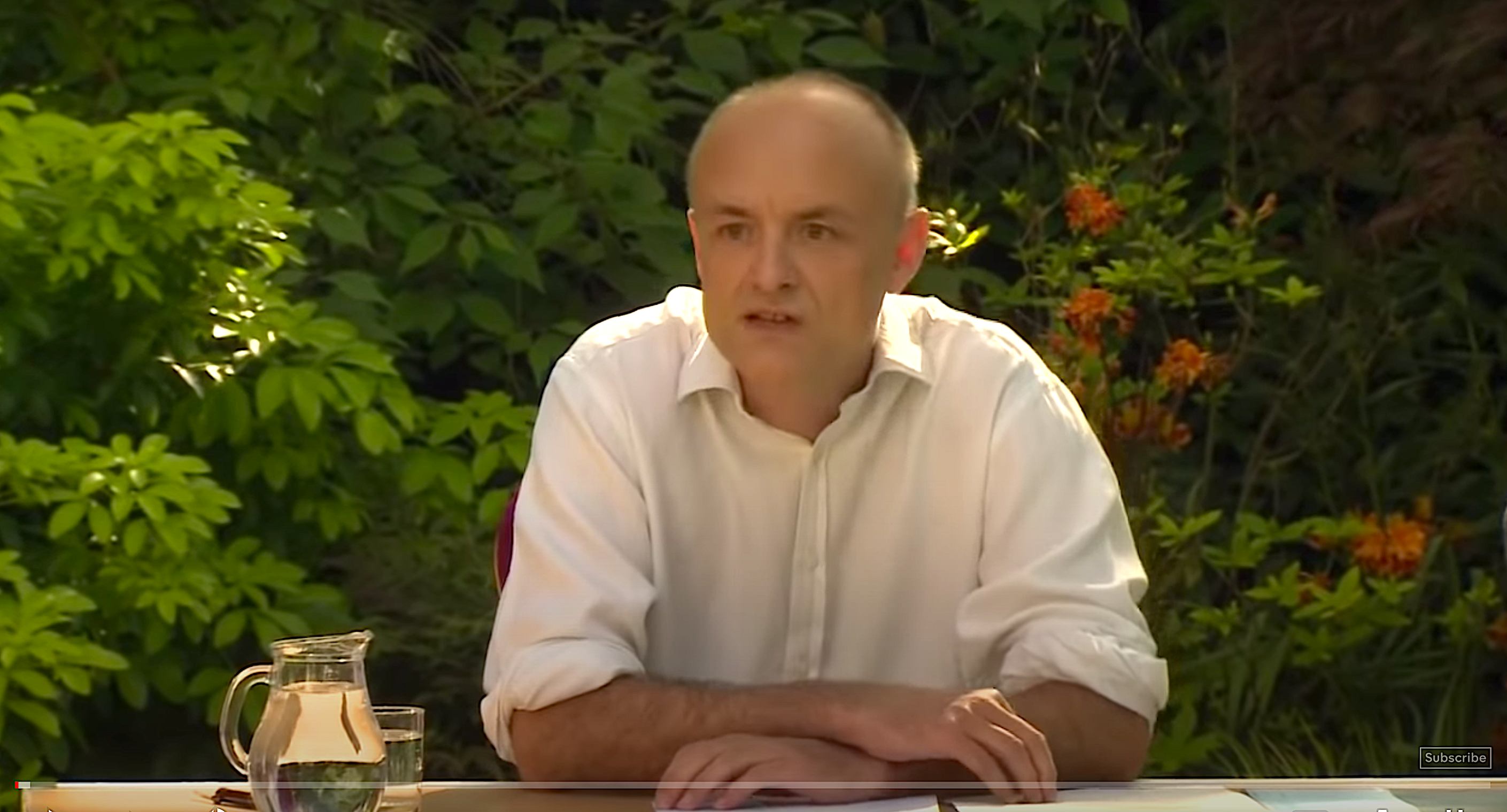

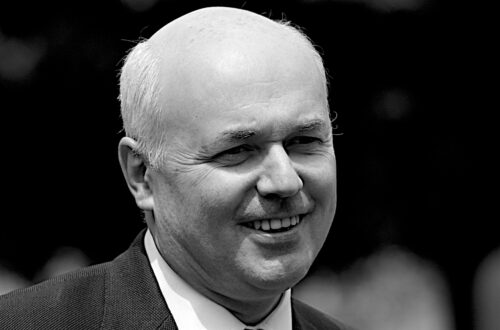
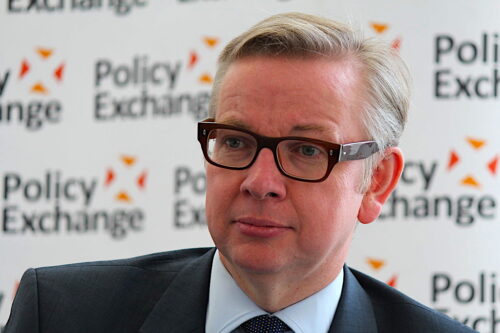
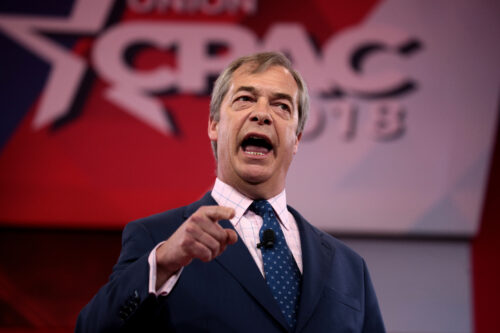
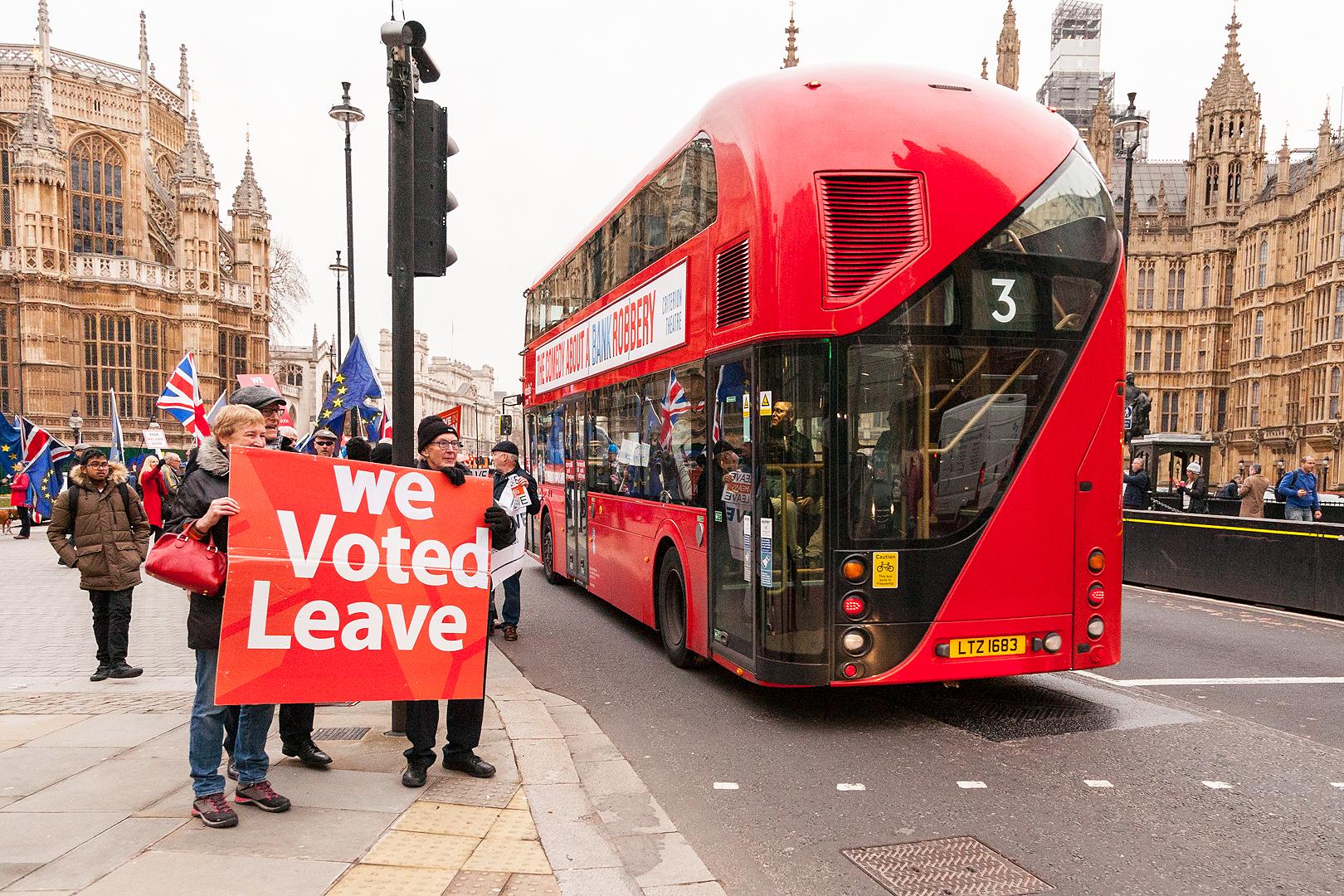
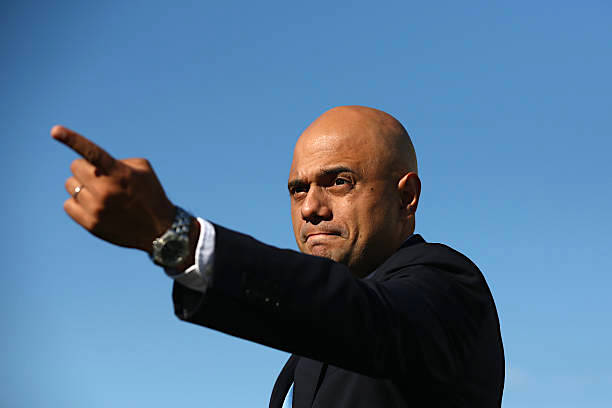
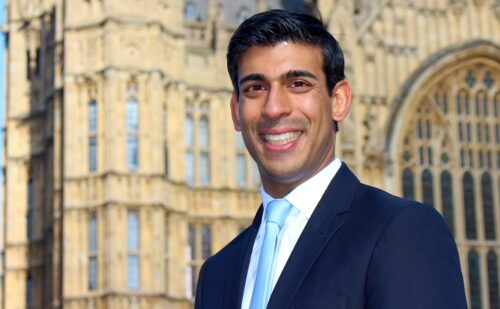
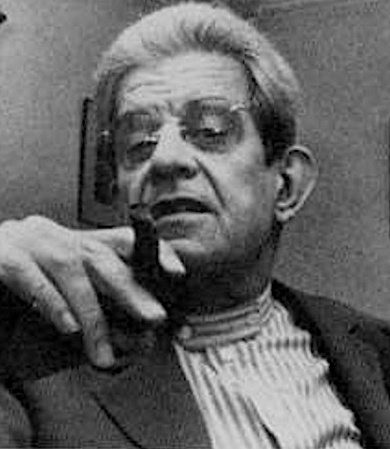
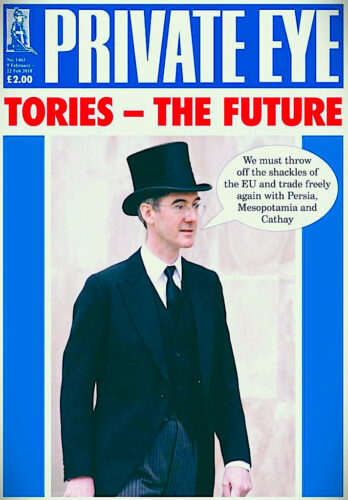



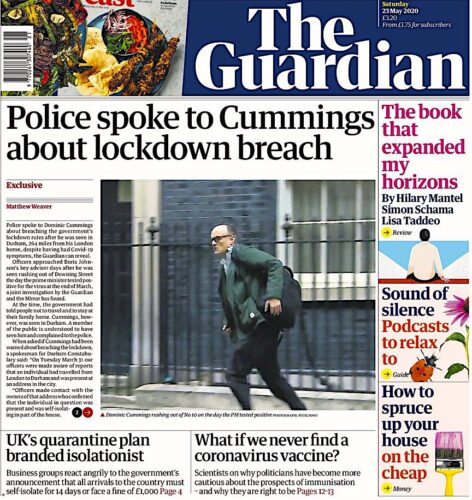




Geen opmerkingen:
Een reactie posten